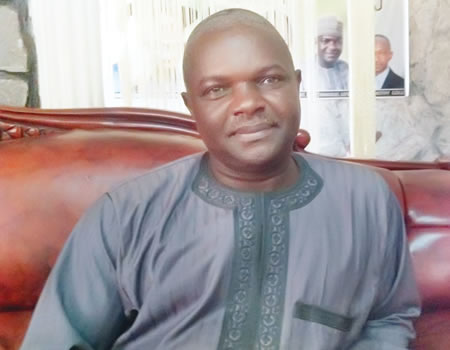Hon. Emmanuel Goar, a former Speaker of the Plateau State House of Assembly, has served the state at the House of Representatives. Goar, a chieftain of the All Progressives Congress (APC) in Plateau State, speaks with ISAAC SHOBAYO on the prevailing politics in Nigeria, the gale of defections, the African Democratic Congress (ADC) coalition, among other issues of national interest.
BASED on the prevailing political situation in the country at the moment, is the country progressing politically?
We’ve seen both the good and the bad, particularly in politics in Nigeria. If you look at the period starting from 1999 up to now, it’s a completely different ball game. To put it simply, the politics today lacks decorum and principles. There is no ideology guiding the political scene anymore. People now seek power at all costs, whereas in 1999, we started with some respect for due process, party politics, and even general election. We respected processes, but now people are willing to bypass all that to get what they want. We are seeing defections and party-switching like never before. Someone has not even spent a year in a party and already moves to another. This raises a lot of questions about how we handle these issues. Perhaps a review of the electoral process and the Constitution could address some of this, but there are still many unanswered questions.
Where is the missing link?
The missing link here is multifaceted. If we take a holistic view of Nigeria today, the issues extend beyond politics. Yes, politics is a major part, but it is the entire system that’s in disarray. Those of us who were in school in the ‘70s, we saw how things were working back then. Today, the system is completely different; it’s like two sides of the same coin, but they are worlds apart. It is not just politics, but the entire system: economy, security, everything. It’s a complete shift from what we knew.
Sir, two years down the line, some individuals are grumbling that the Nigeria under the leadership of President Tinubu has not performed to expectation. Do you subscribe to this view?
No, I don’t belong to that school of thought. The president has taken bold steps to address the already bad situation we inherited, which is a result of years of poor governance. Solving such problems doesn’t come without consequences. We must bear some of the hardship because of the drastic measures that need to be taken. I don’t believe the president hasn’t performed. There are various indices to measure the performance of a government, like the inflation rate, which has been decreasing year by year since he took office. Many issues are being addressed, but the main problem we face is security. Security has a multiplier effect on every part of life in Nigeria: economy, politics, and social life. When security is poor, hardship follows. However, security is not solely the fault of the current government. The present government inherited one of the worst security situations in Nigeria’s history. People are facing hardship, but most of it stems from worsening security conditions.
But it is clear the government is serious about tackling security issues. And you, as a journalist, know that the security problems are complex. There are vested interests both locally and internationally. It is widely reported that some people within the current government might be involved in the insurgency we are witnessing. If that is true, then solving the issue becomes even more complicated. Former President Goodluck Jonathan has even mentioned in the past that there were people in his administration who were indirectly supporting insurgents. If these assertions are accurate, it becomes a far more complex problem.
Moreover, there are international interests tied to Nigeria’s mineral wealth. Nigeria has vast resources, and oil is just a small part of it. The true wealth of Nigeria lies in its minerals. This is why the distribution of crises in the country is often linked to areas where mineral deposits are located. If the Nigerian military were left to handle the situation alone, it wouldn’t take them long to address the issue with Boko Haram. But the problem isn’t that simple. Some of these criminal elements have taken control of the mineral-rich areas. If you go to certain parts of the country, you will see that these resources are a key part of the conflict. There is a strong correlation between the locations of crises and mineral deposits. It is not coincidental. Look at the situation in Plateau State, especially in areas like Wase. Why are people being killed there? It is because of the solid minerals there. If you go there, you will encounter foreigners.
Are you saying that these mineral resources have become a problem to the nation?
Well, I wouldn’t say it is becoming a problem, as it is a blessing from God, but certain people who don’t want us to benefit from our resources are the ones masterminding these crises. So, while I wouldn’t call it a “problem,” that is, unfortunately, the situation we are facing.
Recently, we saw a significant exodus of founding members from APC. What is your impression of this?
This situation is closely tied to what we discussed earlier—people seek power at all costs. When they don’t get the positions they want, their loyalty to the party vanishes. They begin searching for another platform where they might fulfill their ambitions. Itnis not about party principles; it is about power. Take the former Governor Nasir El-Rufai, for example, his name was submitted for screening as a minister, but it was dropped. Had he been appointed, do you think he would be speaking out against this government? Look at Rotimi Amaechi, he aspired to be president but didn’t get it. Now, they are forming coalitions with others. We know each other; we’ve all been in the political game long enough.
So, do they have anything new to offer Nigeria after all these years? No. It’s just about their ambitions. They didn’t get what they wanted in the APC, so now they are looking for a new platform, hoping for a different outcome. It is all trial and error. In essence, what we are seeing is pure over-ambition. They are driven by ambition rather than genuine ideological alignment; such an alliance would likely collapse once the interests of those involved are not met. The question is, can they bring positive change? These are a set of people who have been part of the governance structure for years at different levels. They claim they want to change the system; it is a case of old wine in a new bottle.
If you look at the trend, we’ve seen this before. Tinubu was just elected president, and after two years, people are already shouting from all corners. This has been the pattern since the days of Obasanjo, Yar’Adua, Goodluck Jonathan, and Buhari. When have we been satisfied with a leader enough to give him the benefit of the doubt? Two years in office, and people are already castigating him. How do we expect him to perform under such conditions? If you bring in angel, the people will still be dissatisfied; they will continue to criticize. Is this what is happening in other countries?
With the forces behind the African Democratic Congress (ADC), can your party, APC, withstand the pressure coming from the coalition? The APC defeated the Peoples Democratic Party (PDP) in 2015. Do you see a similar situation playing out now?
Honestly, I don’t believe the ADC coalition is serious. It is made up of ambitious individuals, each of whom wants the ticket for themselves. Peter Obi, Atiku Abubakar, and El-Rufai—they all want the same thing. How are they going to resolve that? Facing an incumbent is not the same as the APC coalition coming together to defeat the PDP. In that case, governors were moving from the PDP to form the APC, which created a strong coalition. But now, we aren’t seeing governors leaving the APC to join the ADC. Instead, we see governors leaving other parties and joining the APC.
But there’s the insinuation that some governors in both APC and PDP are already talking with the ADC …
(Cuts in) How many days are left before the primaries? The party isn’t even consolidated yet; it’s in crisis. The party members are fighting amongst themselves, and some are even accusing others of betrayal, calling them sellouts to the coalition. It’s a struggle over party structure. So, let’s wait and see. But personally, I don’t want to take anything for granted. Look at the situation with Russia and Ukraine. Russia thought it would easily overrun Ukraine, but look at what’s happening now. The situation is much more complicated than expected.
Opposition against the President Tinubu administration has continued to swell in the North. Do you subscribe to the notion that the North is not being carrying along in the scheme of things?
I don’t subscribe to the notion that the current administration is neglecting certain groups or any part of the country for that matter. We need to bring out facts and figures. I have not seen a more liberal president than President Tinubu. For instance, most parts of the North that have been neglected for years are being accorded recognition and priority, especially the minority in the North, they now have sense of belonging, which is something new. And some people in the North may not like this. The assertion by some people that the North is being short-changed by the present administration is a mere political statement or a ploy to deceive gullible northerners, they are simply crying foul where there’s none. Anyway, the minority in the North are satisfied and the recognition is unprecedented. I haven’t seen any president who has been as liberal as President Tinubu, who is willing to recognize and uplift minority tribes across the country. His leadership has been a big relief to them. So, I believe much of the criticism is politically motivated. We’ve been in the game long enough to know that these are just empty noises, and I don’t take them seriously.
What is your advice to the government? In what areas do you think the government can improve?
The government should focus on improving security. If the security situation is properly addressed, everything else will fall into place. It is the security problem that has a multiplier effect on the economy, the hardships we are facing, and even on politics itself. Development is also being hindered by security challenges. You can’t even enter the hinterlands to deliver development without first ensuring security. In some areas, like Borno, much of the land is occupied by bandits, and you have to spend money on security just to take development there.
My advice to the government is to adopt a holistic approach. Despite the complexity of the security issues, if you understand the root causes, solving them becomes much easier.
What is your advice to those who have left the APC?
Well, that masquerades are returning to the shrine is not a mysterious phenomenon. They see the writing on the wall, they see the changes happening. If they want to remain in Egypt, that’s their choice. But my candid advice to those who have left is come back before it is too late. Let’s come together and build this country. The challenges we face are not insurmountable if we unite and work together.
READ ALSO: Poverty of ideology key challenge of party politics in Nigeria ― BUK VC
WATCH TOP VIDEOS FROM NIGERIAN TRIBUNE TV
- Let’s Talk About SELF-AWARENESS
- Is Your Confidence Mistaken for Pride? Let’s talk about it
- Is Etiquette About Perfection…Or Just Not Being Rude?
- Top Psychologist Reveal 3 Signs You’re Struggling With Imposter Syndrome
- Do You Pick Up Work-Related Calls at Midnight or Never? Let’s Talk About Boundaries







